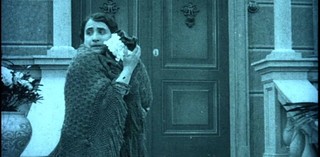The Redeeming Angel 1913 + Prisoner of the Owls 1913 1913

Production still from The Redeeming Angel 1913 / Director: Attillo Fabbri / View full image
When
11.45 am, Sun 5 Feb 2017 (50 mins)Where
Gallery of Modern Art, Cinema A
Accessibility
- Subtitled
- Wheelchair Accessible
About
A presentation of two thought-to-be-lost Italian melodramas - both driven by mistaken identities, criminal scheming, and high passions. Due to the condition in which the prints were found, neither was able to be digitised in their entirety.
Angelo Che Redime (The Redeeming Angel) 1913
A presentation of two short Italian melodramas — both driven by mistaken identities, criminal scheming and high passions. Due to the condition in which the prints were found, neither could be digitised in their entirety. However, they both provide have strong emotional centres and provide fascinating insights into filmmaking styles in Italy at the time of their production.
The print of The Redeeming Angel was found almost entirely complete and in remarkably good quality. The short film is almost totally intact, with only a sudden ending giving away its previously vulnerable state.
The Redeeming Angel finds a couple in the aftermath of a fiery divorce. Due to the closure of their bank, the former wife, Ida, stops receiving her alimony and finds herself impoverished. As she is no longer able to afford to care for their infant daughter, she attempts to return their baby to her ex-husband. However, the infant's return is interrupted by a burglary attempt. The film is creatively shot, with a wide variety of locations and some wonderfully expressive performances.
28 minutes | All Ages
La Prigione D'Acciaio (Prisoner of the Owls) 1913
The print of The Redeeming Angel was found almost entirely complete and in remarkably good quality. The short film is almost totally intact, with only a seemingly sudden ending giving away its previously vulnerable state.The Redeeming Angelfinds a couple in the aftermath of a fiery divorce. Due to the closure of their bank, the former wife, Ida, stops receiving her alimony and finds herself impoverished. As she is no longer able to afford to care for their infant daughter, she attempts to return their baby to her ex-husband. However, the infant's return is interrupted by a burglary attempt on her ex-husband's house. The film is beautifully shot, with a wide variety of locations and some wonderfully expressive performances. It is an engaging drama and a rare chance to see a rich production produced more than a century ago.
Roberto Roberti's Prisoner of the Owls is less complete. The short film appears to be missing a small amount of footage from the opening scene and there is a gap of what appears to be several scenes from the middle of the film. The broad narrative can be followed without issue but these gaps mean that some of the drama of the narrative is lost.
Nevertheless, Prisoner of the Owls remains a terrifically enjoyable experience to watch. At its core is a tragedy of forbidden love, driven by class hierarchies and the inescapable stain of a criminal past. Lord Wilmer, the wealthy father of Vera, forbids the marriage of his daughter to her love. That young man's father takes great offence at this rebuke and organises for his son's criminal friend to be introduced to Lord Wilmer as a Duke, in an attempt to his family's reputation by Vera's inadvertent marriage to a member of the criminal organisation, the Owls. At this point, the missing material from the film means there are some large holes in the narrative. However, the spectacle of the (literally) fiery conclusion means it remains a rousing ride all the way to the final frames.
The films will screen from 2K Digitisations of the original (Positive) print, created by La Cineteca Del Friuli.
Both films will feature live musical accompaniment from David Bailey on the Gallery's 1929 Wurlitzer organ.
22 minutes
Production Credits
Angelo Che Redime (The Redeeming Angel)
- Director: Attillo Fabbri
- Production Company: Milano Films
- Print Source: Joel Archer, La Cineteca del Friuli, Gemona
- Year: 1913
- Runtime: 28 minutes
- Country: Italy
- Language: Italian Intertitles
- Subtitles: English
- Colour: Black & White
- Shooting Format: 35mm
- Screening Format: DCP
La Prigione D'Acciaio (Prisoner of the Owls)
- Director: Roberto Roberti
- Production Company: Aquila Films
- Print Source: Joel Archer
- Shooting Format: 35mm
- Screening Format: DCP
- Year: 1913
- Runtime: 22 minutes
- Country: Italy
- Language: Italian Intertitles
- Subtitles: English
- Sound: Silent (With Live Musical Accompaniment)
- Colour: Tinted Monochrome

